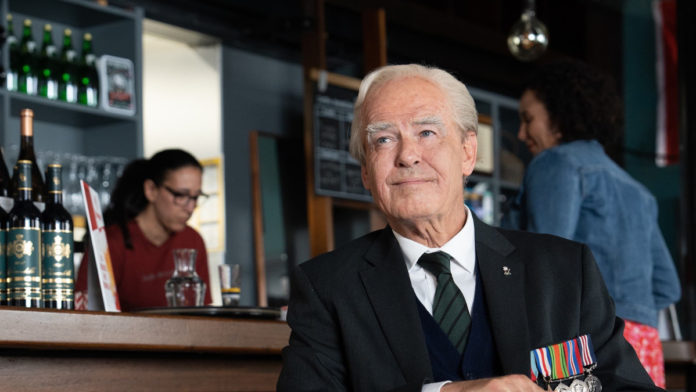You really feel the weight of time when actors you grew up watching on the big screen are suddenly not young anymore. Pierce Brosnan was James Bond, he was that hot guy in Mrs Doubtfire everyone hated on though they had no reason to because he was a decent bloke. In The Last Rifleman, Brosnan plays Artie Crawford, a 92 and 3 quarters year old war veteran who is trying to make it to Normandy for the anniversary of the D-day Landings. Artie’s wife Maggie has just passed on, and he feels he wants to do this one last thing before old age consumes him as well. It’s not the easy journey one might think as Artie stays in a nursing home, which won’t release him due to his whole host of medical conditions. But Artie’s not going to take no for an answer, and embarks on a journey to Normandy despite his various ailments and an expired passport.
Brosnan’s been aged up to play the role, since he’s only 71 in real life. He manages to embody the physicality of a 92 year old man so authentically that I had to double check Brosnan’s age to make sure he didn’t suddenly age double time overnight. It’s also Artie’s first interaction with the world in a long time. Is he clutching both sides of an escalator because he’s old or because he’s kind of forgotten how to be on one after all this time? The movie almost feels like a mix of Remains of the Day and Paddington, as Artie meets various individuals on his journey who help him get where he needs to be.
The Last Rifleman wants us to think about how we look at war. It’s so disconcerting to realise that there’s a special D-Day festival in Normandy held every year to commemorate the event, where visitors can pose with mannequined soldiers and buy merchandise related to the war. While I understand the intention, since it’s also a way for war veterans to reunite, it’s feels bizarre to see war and the suffering of others commodified this way.
The most affecting part of the film is Artie’s interaction with a German soldier, who fought on the opposite side during the war. While Artie’s initial interaction with him is fueled by anger, understandably, the man shares his side of things and makes a valid point about the nature of war. You always think you’re on the right side until the war is over and then you get to see where you truly stand. With everything that’s happening in the world now, it seems that mankind is doomed to repeat the mistakes of the past. There’s also a certain pathos when we think about how Artie spent his youth fighting in war, and then the rest of his life trying to overcome those horrors and memories.
What this movie needed I feel is more sustained flashbacks – this would have given it much-needed emotional weight. In The Last Rifleman, we only see the past in snippets, through Artie’s night terrors regarding the war and some moments with his wife in the past. Artie’s relationship with Maggie is so integral to the story that I wish we saw more of it. We get brief moments in the present as he spends time with her through her last moments, and brief moments in the past where we get to see the beginnings of her dementia taking hold. More time in the past would have also fleshed out Artie’s character beyond just a charming old man who fought in WW2. The Last Rifleman thus ends up a movie that is serviceable but not necessarily memorable.
Review Screener provided.
REVIEW SCORE – 3/5

